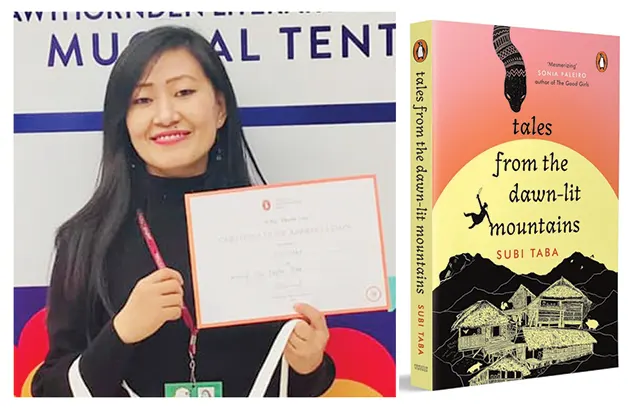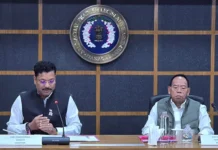[ Indu Chukhu ]
Author and Agriculture Development Officer Subi Taba has made her debut in the publishing world with Tales from the Dawn-lit Mountains, the first short story collection from Arunachal Pradesh, published by Penguin Random House.
“The book is deeply rooted, yet written with a global awareness. Taba’s haunting, beautiful, riveting stories are exceptional not only because they remind us of great writers such as Yeshe Dorje Thongchi, Chandra Barpatragohain, and Mamang Dai, who set their fiction in Arunachal, but also because they make global Anglophone literature richer by jostling for space with writers such as Louise Edrich and LeAnne Howe,” wrote Aruni Kashyap-Radcliffe, author and institute fellow at Harvard University.
“In Tales from the Dawn-lit Mountains, Taba crafts ten mesmerising stories that explore love, loss, and mystery within landscapes rich with myth. With each tale, the ordinary becomes extraordinary, inviting readers into worlds of quiet wonder. Beautifully illustrated, this collection is a journey to cherish,”wrote Sonia Faleiro, Indian writer and journalist based in London.
Taba earlier received the ‘100 Inspiring Authors of India Award’ in 2018 for her poetry anthology, Dear Bohemian Man. She won the New Asian Writing Short Story Prize-2020 and was shortlisted for the Twist and Twain Short Story Prize-2021. She was awarded the South Asia Speaks-2021 fellowship and won Penguin Random House’s ‘The Perfect Pitch,Season 1’.
The following is the author in conversation with this daily.
Question: Can you share something about your book?
Answer: Tales from the Dawn-lit Mountains is my debut fiction and the book presents stories from Arunachal, which are shaped by the hilly terrains of Arunachal, stirred by the speeding mountain rivers, flavoured by the harvests of the soil, and tempered by the tribal folks living in the isolated hinterlands under the intervening shadows of magic and realism. Each story is a glimpse into the heart of life. It’s a peek inside the dark corridors of a long bamboo house in the hills. A look at the wild outcry rising amidst a fire lit up in the distant mountain villages. The book comes with evocative illustrations, which showcases the beauty of our culture.
Q: The book was an interesting read, carrying all aspects of Arunachali practices. Anything interesting for the readers?
A: Of course, there are stories from different districts and communities of Arunachal, with themes for every kind of reader.
There are mythical stories about spirit tigers, about imagined past of the headhunting warriors, about the status of indigenous priests during the modern times; fantastical stories about friendship between a mystical python and a human; a story about the curse of a high priest following the theft of sacred ornaments; about the forest spirit, locally called yapam; about the past practice of forced marriage by physical wooden entrapment called lappa; and symbolism of animals in the culture, romance of the flora and fauna in the vast ecology of the Pakke Tiger Reserve, and geo-political aberrations in the McMahon Line in the Chinese borderlands and its implications on the rural communities.
Q: Getting a publishing house like Penguin Random House, how are you feeling about it? Was it difficult to pitch to them? How did it all happen?
A: This book has its own long story about being published. During the pandemic, I submitted a story for a competition which went on to win the New Asian Short Story Prize. That encouragement led the manuscript to culminate into a fiction project. I was awarded the South Asia Speaks fellowship in the same year, 2021, which is a literary mentorship programme for emerging writers from South Asia. When the manuscript was completed, I applied for a pitching contest and, as luck would have it, this book went on to win ‘The Perfect Pitch’ organised by Penguin Random House at the Jaipur Literature Festival in 2023, beating 250 entries from all over India. That led to the start of the editorial and publication process of this book with Penguin Random House. When I was young, I used to dream about getting published by Penguin Random House,and now I am debuting as an author with Penguin Random House! So, I am very mindful of this great opportunity that I am bestowed with, and I look forward to this experience with an open heart.
Q: When is the book going to be released? How can one have a copy of the book and how to order it?
A: The book is slated for release on 28 March, 2025. The pre-order for the book is already live on Amazon. For now, the book can be ordered from Amazon and in the coming months, it will be available on other e-commerce platforms and local bookshops.
Q: In Tales from the Dawn-lit Mountains, one of the paragraph reads: “In the cobra man, an ignorant village man accidentally becomes a national media sensation as the cobra-man after a casual video footage goes viral.” Did it hint at the cobra story here in Arunachal that had gone viral during the Covid lockdown?
A: Yes, the story is inspired by the news. I really was intrigued by that cobra story and felt the need to write the story. I was unaware that king cobra is listed in the IUCN until I saw the news. The story in the book attempts to create awareness about the importance of the Wildlife Protection Act and how we as a society should help in protecting the vulnerable species of flora and fauna from extinction. Tales from the Dawn-lit Mountains has many animal characters, like tigers, pigs, dogs, cobras, pythons, domestic fowls, wild boars, hornbills, cicadas and musk deer, which is a subtle way of sharing my fascination and admiration for the animal kingdom. There are also stories dedicated to the vast wilderness and beauty of the Pakke Tiger Reserve.
Q: Would you like to say anything about the cover and also about how the name of the book came about?
A: The cover is a dramatic representation of the magical and mystical adventure stories that come from Arunachal, the land of dawn-lit mountains. There is a representation of a giant snake on the cover, which is an important character in the book. There are traditional bamboo houses with a dog, a rooster and a pig, which are a representation of rural life in every Arunachali village. The back cover has a man and a tiger, representing the myth that man and tiger originated from the same spirit realm.
The book project started with the title Tales from the Hinterlands, but my editor suggested that I change it to Tales from the Dawn-lit Mountains, which we felt gave a truer representation of Arunachal.



